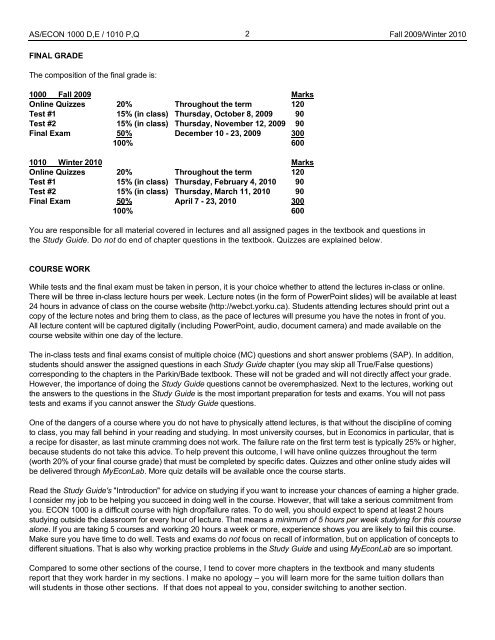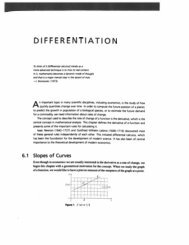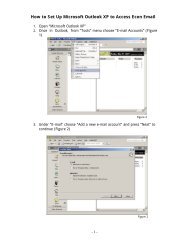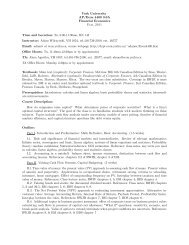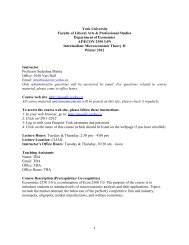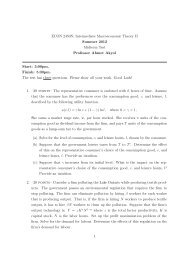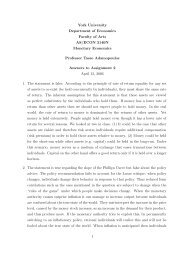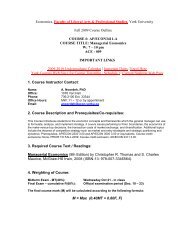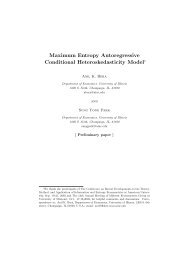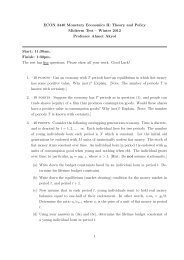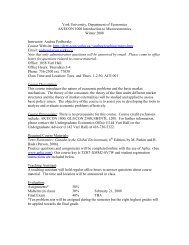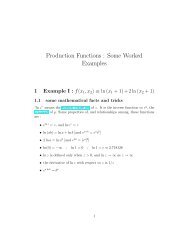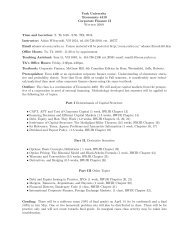Introduction to Microeconomics AP/ECON 1000 3.0DF
Introduction to Microeconomics AP/ECON 1000 3.0DF
Introduction to Microeconomics AP/ECON 1000 3.0DF
You also want an ePaper? Increase the reach of your titles
YUMPU automatically turns print PDFs into web optimized ePapers that Google loves.
AS/<strong>ECON</strong> <strong>1000</strong> D,E / 1010 P,Q 2Fall 2009/Winter 2010FINAL GRADEThe composition of the final grade is:<strong>1000</strong> Fall 2009 MarksOnline Quizzes 20% Throughout the term 120Test #1 15% (in class) Thursday, Oc<strong>to</strong>ber 8, 2009 90Test #2 15% (in class) Thursday, November 12, 2009 90Final Exam 50% December 10 - 23, 2009 300100% 6001010 Winter 2010 MarksOnline Quizzes 20% Throughout the term 120Test #1 15% (in class) Thursday, February 4, 2010 90Test #2 15% (in class) Thursday, March 11, 2010 90Final Exam 50% April 7 - 23, 2010 300100% 600You are responsible for all material covered in lectures and all assigned pages in the textbook and questions inthe Study Guide. Do not do end of chapter questions in the textbook. Quizzes are explained below.COURSE WORKWhile tests and the final exam must be taken in person, it is your choice whether <strong>to</strong> attend the lectures in-class or online.There will be three in-class lecture hours per week. Lecture notes (in the form of PowerPoint slides) will be available at least24 hours in advance of class on the course website (http://webct.yorku.ca). Students attending lectures should print out acopy of the lecture notes and bring them <strong>to</strong> class, as the pace of lectures will presume you have the notes in front of you.All lecture content will be captured digitally (including PowerPoint, audio, document camera) and made available on thecourse website within one day of the lecture.The in-class tests and final exams consist of multiple choice (MC) questions and short answer problems (S<strong>AP</strong>). In addition,students should answer the assigned questions in each Study Guide chapter (you may skip all True/False questions)corresponding <strong>to</strong> the chapters in the Parkin/Bade textbook. These will not be graded and will not directly affect your grade.However, the importance of doing the Study Guide questions cannot be overemphasized. Next <strong>to</strong> the lectures, working outthe answers <strong>to</strong> the questions in the Study Guide is the most important preparation for tests and exams. You will not passtests and exams if you cannot answer the Study Guide questions.One of the dangers of a course where you do not have <strong>to</strong> physically attend lectures, is that without the discipline of coming<strong>to</strong> class, you may fall behind in your reading and studying. In most university courses, but in Economics in particular, that isa recipe for disaster, as last minute cramming does not work. The failure rate on the first term test is typically 25% or higher,because students do not take this advice. To help prevent this outcome, I will have online quizzes throughout the term(worth 20% of your final course grade) that must be completed by specific dates. Quizzes and other online study aides willbe delivered through MyEconLab. More quiz details will be available once the course starts.Read the Study Guide's "<strong>Introduction</strong>" for advice on studying if you want <strong>to</strong> increase your chances of earning a higher grade.I consider my job <strong>to</strong> be helping you succeed in doing well in the course. However, that will take a serious commitment fromyou. <strong>ECON</strong> <strong>1000</strong> is a difficult course with high drop/failure rates. To do well, you should expect <strong>to</strong> spend at least 2 hoursstudying outside the classroom for every hour of lecture. That means a minimum of 5 hours per week studying for this coursealone. If you are taking 5 courses and working 20 hours a week or more, experience shows you are likely <strong>to</strong> fail this course.Make sure you have time <strong>to</strong> do well. Tests and exams do not focus on recall of information, but on application of concepts <strong>to</strong>different situations. That is also why working practice problems in the Study Guide and using MyEconLab are so important.Compared <strong>to</strong> some other sections of the course, I tend <strong>to</strong> cover more chapters in the textbook and many studentsreport that they work harder in my sections. I make no apology – you will learn more for the same tuition dollars thanwill students in those other sections. If that does not appeal <strong>to</strong> you, consider switching <strong>to</strong> another section.


